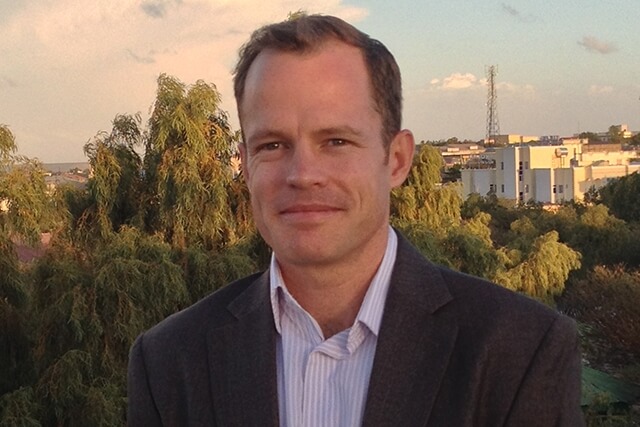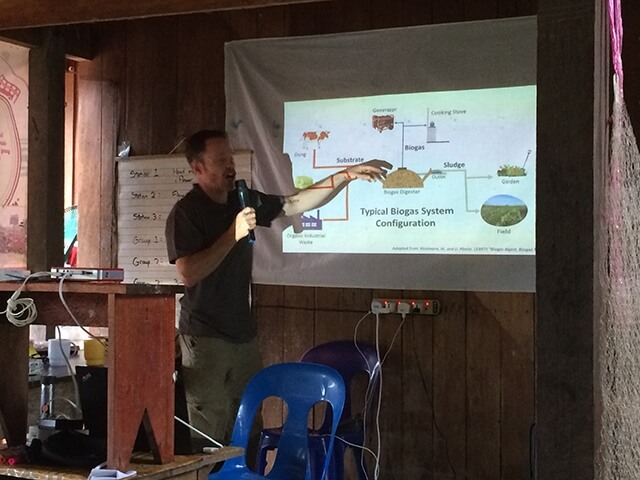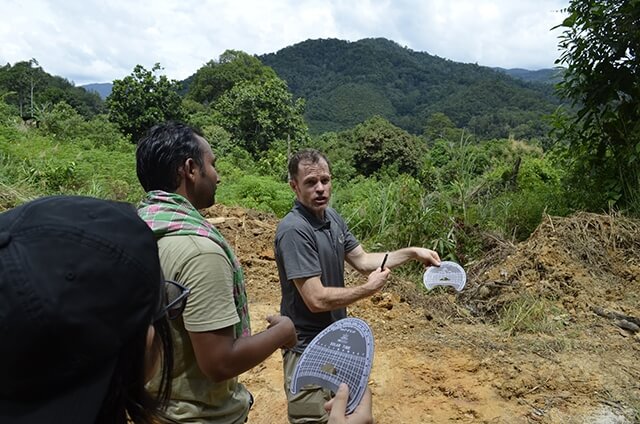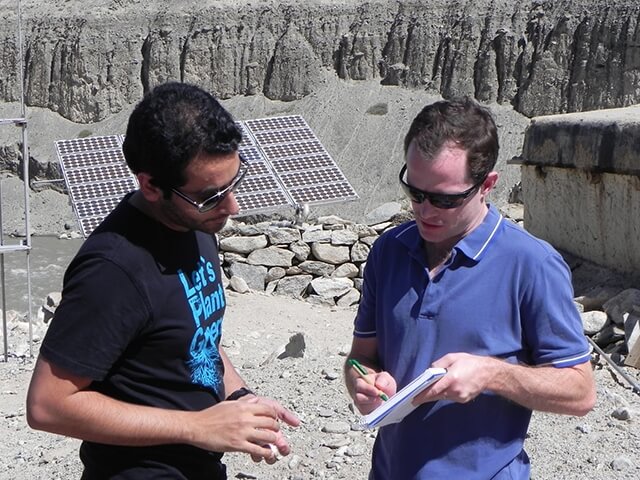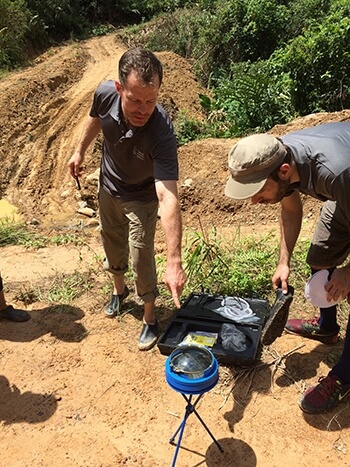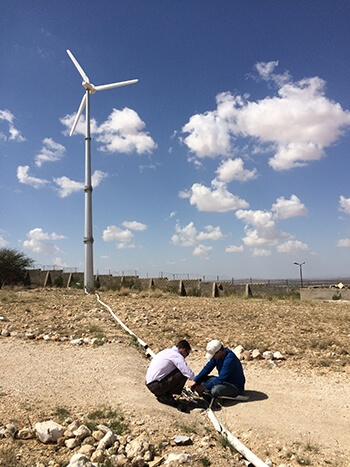For the more than 1 billion people around the world who lack access to electricity, mini-grids—community-based clean energy systems that generate power at the point of consumption—seem like an ideal solution.
But examples abound of well-meaning organizations building mini-grids that become broken or vandalized with no hope of repair or are later abandoned by communities that don’t understand how to use them.
That’s a problem Energy Action Partners endeavors to solve. Founded by Scott Kennedy, Ph.D. ’03, the nonprofit community engagement consultant bridges the gaps that exist between developers, engineers, and the individuals the mini-grids are designed to serve.
“We recognized from our own research and practical work in the energy access field that, while the technology infrastructure provision is one important piece, achieving the development objectives also relies on how you engage a community in that technology adoption,” said Kennedy, an alumnus of the Harvard John A. Paulson School of Engineering and Applied Sciences and Graduate School of Arts and Sciences. “Mini-grids are particularly challenging infrastructures from a social-technical side because they are tightly constrained in their physical power availability, and at the same time you may need to create new institutions that haven’t existed previously in the community to operate or manage the energy system. So all sorts of conflicts tend to arise.”
Kennedy teaches in a village "lecture hall" on bioenergy systems. (Photo provided by Scott Kennedy)
To head-off those conflicts, Energy Action Partners has developed a computer game to educate community members about the technology, while helping engineers gather specific information they might otherwise miss.
The Minigrid Game is a participatory platform in which project developers and community members can explore different scenarios together, Kennedy explained. Individuals can purchase and use various appliances to see how each impacts the power supply, while developers can see how supply and demand play out based on the size of the mini-grid.
“The way the power system works can be very confusing, even for someone who has had electricity all their life,” Kennedy said. “It is very hard for a developer to explain that kind of system. But at the same time, it can be even more difficult for a developer to get information on what the community’s usage patterns will be.”
The game can also open larger conversations by exploring specific scenarios. For instance, one community member might be asked to “steal” power, and then the group would discuss how to handle that situation. Energy Action Partners currently facilitates the game in partnership with developers, but the nonprofit is developing a version they will offer directly to the public.
Kennedy, who has deployed the game in eight communities since 2014, sees it as a way to build trust between service providers and communities, and empower residents to have a hand in the decision making process.
Evaluating sun path diagrams for the course "Designing Sustainable Energy Systems for Community Development," in Buayan Village, Sabah, Malaysia, in 2017 (Photo provided by Scott Kennedy)
He saw the importance of trust-building and community empowerment firsthand during a career developing academic programs overseas.
A mechanical engineer, he decided to pursue a Ph.D. at SEAS due to the school’s cross-disciplinary nature. He won a Hertz Fellowship to fund his studies, but remained unsure what to focus on in the lab of Peter Rogers, Gordon McKay Professor of Environmental Engineering. After overhearing a party guest speaking about wind power, Kennedy was intrigued and began to dive deeper.
For his dissertation, he explored how large-scale wind power development off the coast of Long Island could affect the New York power system.
“I had always been interested in social impact. Climate and environmental issues drew me in. I was trying to be a little bit of a devil’s advocate with my research. Renewables are great, but are there unintended consequences of putting too much power into the system?” he said. “I began to look at how you could manipulate pricing to influence demand response, and that pulled we away from mechanical engineering and into planning and economics.”
Kennedy conducts solar system planning in Leh, Ladakh for the course "Energy Access, Ethics and Development." (Photo provided by Scott Kennedy)
While attending an environmental science lecture, Kennedy overheard someone talking about Malaysia—his wife’s native country, which he had called home during a brief stint with the World Wildlife Fund. MIT was setting up a new university there, and Kennedy joined the effort as a research associate.
He was tasked with establishing a master’s program in energy and environmental management at the nascent Malaysia University of Science and Technology. As the program’s lone faculty member, Kennedy oversaw everything from hiring personnel, to conducting research, to engaging the government for funding, to teaching and mentoring students.
Though he enjoyed the opportunity to make an impact in so many areas, the new university faced numerous financial hurdles that administrators struggled to overcome, resulting in the end of the project.
Kennedy then joined another new international initiative launched by MIT, serving as dean of research at the Masdar Institute of Science and Technology in Abu Dhabi. Working in the engineering systems and management program, Kennedy led research initiatives, advised students, and worked on renewable energy projects.
Using a solar pathfinder in the course "Designing Sustainable Energy Systems for Community Development," in Buayan Village, Sabah, Malaysia, in 2017 (Photo provided by Scott Kennedy)
“It was rewarding to build things from the ground up. We were really creating everything fresh, and launched a number of research centers focused on really important work in renewable energy,” he said. “My research focus started to shift toward social systems and energy access. I was able to create several courses and research programs to expose students to the challenges of energy and international development.”
Two Masdar graduates who had taken those courses co-founded Energy Action Partners with Kennedy a few years later.
Now, drawing on their experiences volunteering in Somaliland, a self-declared state adjacent to Somalia, Kennedy has launched a new venture, ClearSky
Kennedy makes wiring adjustments for the wind turbine at Abaarso School of Science and Technology, Somaliland. (Photo provided by Scott Kennedy)
Power. The new engineering firm is designing and deploying mini-grid systems throughout Somaliland.
The region lacks a centralized power grid, and while municipal electricity companies serve some cities, that leaves many gaps, Kennedy explained. ClearSky Power focuses on installing solar systems at commercial properties to help drive down the high cost of electricity. The company has installed three solar-hybrid systems so far, at a university, hotel, and a school, and is looking to expand in an effort to encourage economic development.
For Kennedy, it is challenging to be back in the boots-on-the-ground engineering world, but he feels gratified to make an impact for people with dire needs.
“I really like building organizations and trying to tackle interconnected problems where multiple disciplines are required,” he said. “Whether we are commissioning a new solar system or working with a community to improve their energy management, I thrive on projects where the outcomes improve the lives of others. That is very rewarding.”
Press Contact
Adam Zewe | 617-496-5878 | azewe@seas.harvard.edu
